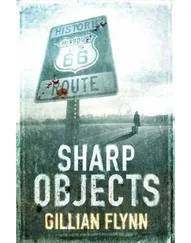Boney looked believably annoyed. “I catch bad guys too, idiot.”
Gilpin rolled his eyes toward me; I almost expected him to make a joke —sounds like someone’s on the rag —the guy was laying it on so thick.
Gilpin rubbed his vulpine jaw. “So you just wanted a housewife,” he said to me, making the proposition seem reasonable.
“I wanted—I wanted whatever Amy wanted. I really didn’t care.” I appealed to Boney now, Detective Rhonda Boney with the sympathetic air that seemed at least partly authentic. ( It’s not , I reminded myself.) “Amy couldn’t decide what to do here. She couldn’t find a job, and she wasn’t interested in The Bar. Which is fine, if you want to stay home, that’s fine, I said. But when she stayed home, she was unhappy too. And she’d wait for me to fix it. It was like I was in charge of her happiness.”
Boney said nothing, gave me a face expressionless as water.
“And, I mean, it’s fun to be hero for a while, be the white knight, but it doesn’t really work for long. I couldn’t make her be happy. She didn’t want to be happy. So I thought if she started taking charge of a few practical things—”
“Like the cat box,” said Boney.
“Yeah, clean the cat box, get some groceries, call a plumber to fix the drip that drove her crazy.”
“Wow, that sounds like a real happiness plan there. Lotta yuks.”
“But my point was, do something . Whatever it is, do something. Make the most of the situation. Don’t sit and wait for me to fix everything for you.” I was speaking loudly, I realized, and I sounded almost angry, certainly righteous, but it was such a relief. I’d started with a lie—the cat box—and turned that into a surprising burst of pure truth, and I realized why criminals talked too much, because it feels so good to tell your story to a stranger, someone who won’t call bullshit, someone forced to listen to your side. (Someone pretending to listen to your side, I corrected.)
“So the move back to Missouri?” Boney said. “You moved Amy here against her wishes?”
“ Against her wishes? No. We did what we had to do. I had no job, Amy had no job, my mom was sick. I’d do the same for Amy.”
“That’s nice of you to say ,” Boney muttered. And suddenly she reminded me exactly of Amy: the damning below-breath retorts uttered at the perfect level, so I was pretty sure I heard them but couldn’t swear to it. And if I asked what I was supposed to ask— What did you say ?—she’d always say the same: Nothing . I glared at Boney, my mouth tight, and then I thought: Maybe this is part of the plan, to see how you act toward angry, dissatisfied women . I tried to make myself smile, but it only seemed to repulse her more.
“And you’re able to afford this, Amy working, not working, whatever, you could swing it financially?” Gilpin asked.
“We’ve had some money problems of late,” I said. “When we first married, Amy was wealthy, like extremely wealthy.”
“Right,” said Boney, “those Amazing Amy books.”
“Yeah, they made a ton of money in the eighties and nineties. But the publisher dropped them. Said Amy had run her course. And everything went south. Amy’s parents had to borrow money from us to stay afloat.”
“From your wife, you mean?”
“Right, fine. And then we used most of the last of Amy’s trust fund to buy the bar, and I’ve been supporting us since.”
“So when you married Amy, she was very wealthy,” Gilpin said. I nodded. I was thinking of the hero narrative: the husband who sticks by his wife through the horrible decline in her family’s circumstances.
“So you had a very nice lifestyle.”
“Yeah, it was great, it was awesome.”
“And now she’s near broke, and you’re dealing with a very different lifestyle than what you married into. What you signed on for.”
I realized my narrative was completely wrong.
“Because, okay, we’ve been going over your finances, Nick, and dang, they don’t look good,” Gilpin started, almost turning the accusation into a concern, a worry.
“The Bar is doing decent,” I said. “It usually takes a new business three or four years to get out of the red.”
“It’s those credit cards that got my attention,” Boney said. “Two hundred and twelve thousand dollars in credit-card debt. I mean, it took my breath away.” She fanned a stack of red-ink statements at me.
My parents were fanatics about credit cards—used only for special purposes, paid off every month. We don’t buy what we can’t pay for . It was the Dunne family motto.
“We don’t—I don’t, at least—but I don’t think Amy would—Can I see those?” I stuttered, just as a low-flying bomber rattled the windowpanes. A plant on the mantel promptly lost five pretty purple leaves. Forced into silence for ten brain-shaking seconds, we all watched the leaves flutter to the ground.
“Yet this great brawl we’re supposed to believe happened in here, and not a petal was on the floor then,” Gilpin muttered disgustedly.
I took the papers from Boney and saw my name, only my name, versions of it—Nick Dunne, Lance Dunne, Lance N. Dunne, Lance Nicholas Dunne, on a dozen different credit cards, balances from $62.78 to $45,602.33, all in various states of lateness, terse threats printed in ominous lettering across the top: pay now.
“Holy fuck! This is, like, identity theft or something!” I said. “They’re not mine. I mean, freakin’ look at some of this stuff: I don’t even golf.” Someone had paid over seven thousand dollars for a set of clubs. “Anyone can tell you: I really don’t golf.” I tried to make it sound self-effacing —yet another thing I’m not good at— but the detectives weren’t biting.
“You know Noelle Hawthorne?” Boney asked. “The friend of Amy’s you told us to check out?”
“Wait, I want to talk about the bills, because they are not mine,” I said. “I mean, please, seriously, we need to track this down.”
“We’ll track it down, no problem,” Boney said, expressionless. “Noelle Hawthorne?”
“Right. I told you to check her out because she’s been all over town, wailing about Amy.”
Boney arched an eyebrow. “You seem angry about that.”
“No, like I told you, she seems a little too broken up, like in a fake way. Ostentatious. Attention-seeking. A little obsessed.”
“We talked to Noelle,” Boney said. “Says your wife was extremely troubled by the marriage, was upset about the money stuff, that she worried you’d married her for her money. She says your wife worried about your temper.”
“I don’t know why Noelle would say that; I don’t think she and Amy ever exchanged more than five words.”
“That’s funny, because the Hawthornes’ living room is covered with photos of Noelle and your wife.” Boney frowned. I frowned too: actual real pictures of her and Amy?
Boney continued: “At the St. Louis zoo last October, on a picnic with the triplets, on a weekend float trip this past June. As in last month .”
“Amy has never uttered the name Noelle in the entire time we’ve lived here. I’m serious.” I scanned my brain over this past June and came upon a weekend I went away with Andie, told Amy I was doing a boys’ trip to St. Louis. I’d returned home to find her pink-cheeked and angry, claiming a weekend of bad cable and bored reading on the dock. And she was on a float trip? No. I couldn’t think of anything Amy would care for less than the typical midwestern float trip: beers bobbing in coolers tied to canoes, loud music, drunk frat boys, campgrounds dotted with vomit. “Are you sure it was my wife in those photos?”
Читать дальше












